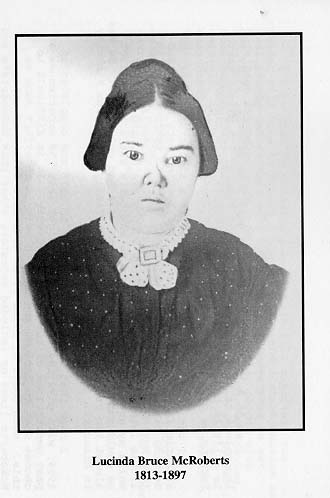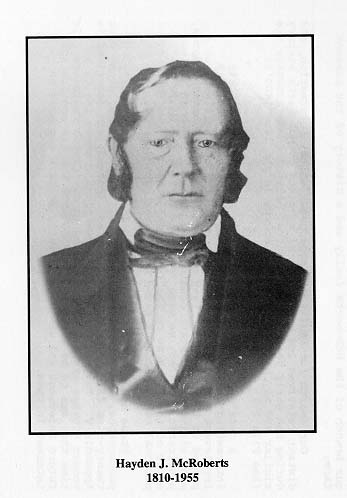Hayden and Lucinda Bruce McRoberts
submitted
by great-great grandson
Mac McCutchen
The McRoberts, Bruce, and Hanly lines came to Lewis County the hard (but usual) way. The McRoberts family were Scotch-Irish, coming from County Antrim to Virginia. Fighting the Revolutionary War, and moving on through the Cumberland Gap and into “the dark and bloody ground” – Kentucky. The Bruces were Scottish, and were exiled from Scotland to Barbados, but found their way to Virginia, fought the Revolution, and went on to Kentucky. The Hanlys were late-comers – an Irish and Spanish family, who came to Maryland in 1805, and went on to Kentucky during the War of 1812.
To make a long story short, it was
Hayden McRoberts and Lucinda Bruce McRoberts (married in
Kentucky) who made the next move (to Missouri), ending a 50-year
stay in Lincoln Co., Kentucky for the McRoberts and Bruce
families. They broke the mold in another way as
well…they were the first and only family in our tree, as far
as is known, to make a significant move by riverboat (in
1853). They took riverboats down the Ohio to the
Mississippi at Cairo, then went up the Mississippi almost to
Iowa, stopping at Canton, Missouri. Actually, Lucinda and
their five children made the trip alone; Hayden had to remain
behind, to take care of a legal problem which had arisen.
He joined them after several months. They were a devoted
couple; letters between them have survived from the period of
their involuntary separation, and the affection is
apparent. Children included Henry Sidney (who died at age
4), William Bruce (b. 1845), Mary Linn (1846), Hayden Jo (1851),
and Elizabeth (Bettie - b. 1854). For sketches of Hayden J.
and Lucinda Bruce McRoberts, see below.
 |
 |
Regrettably, Hayden died soon after the move to Missouri, in 1855. Hayden and his father made a trip to St. Louis, and Hayden died of cholera soon thereafter. Lucinda was left on her own, with a large family of young children. She was a remarkable woman, and coped very well. She sold the farm Hayden had bought, and made her living for a time buying and selling land, and making loans and investments. In 1861, when her eldest son was old enough to help, she and her son (William Bruce McRoberts) bought a farm in 1861. This is the farm depicted in the engraving. She later bought adjoining farms for each of her children. This land has remained with the McRoberts family ever since, although it has been necessary to buy it back a time or two. Several of the children elected to move or take up other professions, and sold their farms. Ultimately, however, the family bought the farms back, and McRoberts Farms, Inc. remains a major farming operation in the Monticello, MO, area.
For a depiction of the McRoberts farm in 1878, see the following page. It is evident that Lucinda and her eldest son (W.B. McRoberts) were good farmers and managers.
One of the children, Mary Linn
McRoberts, married T.B. Hanly. T.B. and Mary Linn were
among those who sold the farm given them by Lucinda, since T.B.
became a lawyer, and ultimately a judge. They moved to
Monticello, where Judge Hanly became a leading citizen and a
leader in the Temperance movement. T.B. Hanly and Mary Linn
McRoberts Hanly are buried in the town cemetery in Monticello.
- You are the [an error occurred while processing this directive] visitor since the
counter was installed on March 16, 2001
Table of Contents is maintained by the Angela DiBlasi